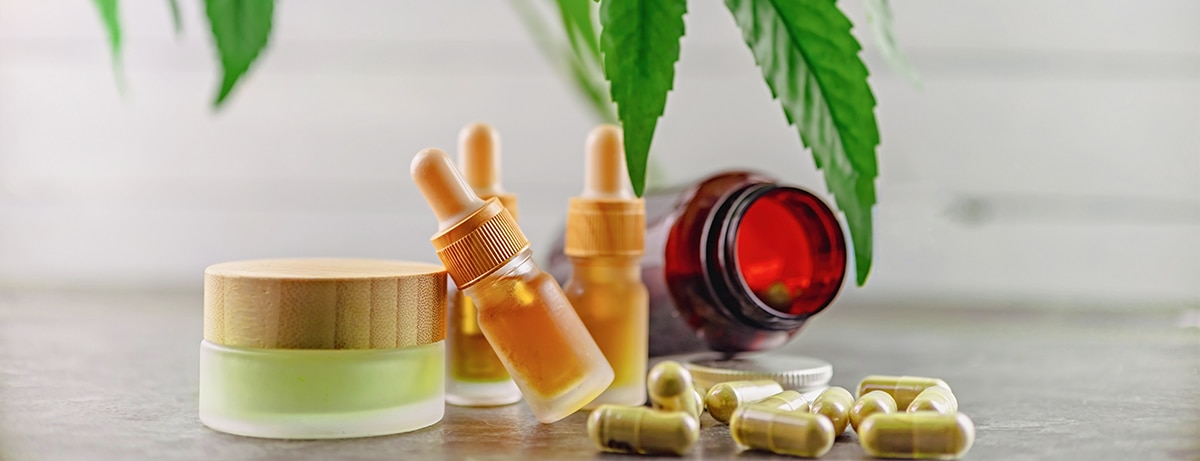20% off £30
Answering your questions on CBD

We answer your most Googled questions on CBD
CBD products are everywhere these days, with drops for your coffee or in fruity gummies. But when we think of CBD, it’s easy to jump to the stereotypes of cannabis, but that’s not the case with CBD products. So to set the story straight, we’re answering some of the most commonly Googled questions on CBD, below.
1. What is CBD?
CBD is short for cannabidiol (which is a bit wordy, so we’ll stick to CBD) and it’s the second most significant active ingredient in cannabis1. It's either sourced directly from the hemp plant or made in a lab and it does not cause a “high” in isolation, meaning you won’t get high from using CBD products as it doesn’t contain THC2.

2. What is CBD used for?
3. Will CBD make you drowsy?
Potentially, yes. Some people may find that it causes them to feel drowsy – but everyone’s experience may be different.4,5
4. What CBD product is right for me?
When it comes to choosing a CBD product, there are a couple of different factors you should consider first. The strength of the product should be taken into consideration, because you may not feel confident going for a high-strength option right away – and it’s likely better to build it up slowly!
Additionally, you should consider the format of your CBD. For example, if can’t swallow tablets you can choose an option that suits you better. Or if you’re not sure about the taste of CBD, you can opt for a flavoured product instead. The different formats of CBD that you can choose from include:
5. Can CBD help with IBS?
Irritable Bowel Syndrome (IBS) is a common condition that affects the digestive system, causing symptoms like stomach cramps, bloating, diarrhoea and constipation6. Some research suggests that CBD may help to manage pain and inflammation – which play a role in IBS.7,8,9
Having said this, it’s not approved as a remedy for this condition, so it’s best to speak to a medical professional for advice and treatment first.
6. How does CBD work for pain?
While research is ongoing, some recent studies suggest that CBD helps to regulate the perception of pain.10,11
Specifically, CBD might aid in reducing chronic pain by affecting something called the endocannabinoid system – which plays a part in a variety of bodily functions, like the immune response, sleep, appetite and pain sensation.12,13
In terms of the type of pain it may help, nerve and back pain seem to be the most successful. However, some studies suggest that it’s most effective when taken with THC.14,15
7. Are CBD drinks legal?
As long as the manufacturer follows the regulatory guidelines, CBD drinks are legal in the UK.

8. Can CBD help me sleep?
9. How to take CBD oil
CBD oil comes in a range of formats, but if you want to know how to take it from a dropper, here’s what you have to do:
- Drop the specified amount of CBD oil under the tongue.
- Let it sit for around a minute to let it absorb before swallowing.
- Have a nice drink ready as it can taste a little funky at first.
All about CBD
From whether CBD can make you high to why it has gained popularity in the past few years, we sit down with Naomi, our Store Colleague and Wellness Expert and Alex, our Senior Nutritionist who break down the stereotypes of CBD...
All about CBD
Head to our YouTube channel to discover more videos like this!
The final say
And that wraps up the most frequently Googled questions about CBD, so we hope that we’ve answered some of your burning questions. For more information like these check out our latest articles below:
1. https://www.health.harvard.edu/blog/cannabidiol-cbd-what-we-know-and-what-we-dont-2018082414476
2. https://www.cdc.gov/marijuana/featured-topics/CBD.html
3. https://www.nhs.uk/conditions/medical-cannabis/
5. https://www.sleepfoundation.org/sleep-aids/cbd-for-sleep
6. https://www.nhs.uk/conditions/irritable-bowel-syndrome-ibs/
7. https://www.ncbi.nlm.nih.gov/pmc/articles/PMC6159811/
8. https://www.ncbi.nlm.nih.gov/pmc/articles/PMC4669958/
9. https://www.ncbi.nlm.nih.gov/pmc/articles/PMC7023045/
10. https://www.frontiersin.org/articles/10.3389/fphar.2018.01259/full
11. https://pubmed.ncbi.nlm.nih.gov/25744668/
12. https://pubmed.ncbi.nlm.nih.gov/32648908/
13. https://www.ncbi.nlm.nih.gov/pmc/articles/PMC5922297/
14. https://pubmed.ncbi.nlm.nih.gov/32421842/
15. https://pubmed.ncbi.nlm.nih.gov/33981161/
16. https://111.wales.nhs.uk/Hangover/
17. https://www.ncbi.nlm.nih.gov/pmc/articles/PMC3165951/
18. https://www.ncbi.nlm.nih.gov/pmc/articles/PMC6326553/















